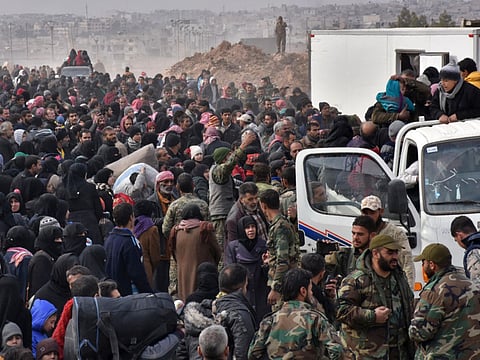Mass round-ups in Aleppo spark execution fears
Relentless shelling by the Syrian regime continues as bombs fall “like rain”

Beirut: Syrian forces have rounded up hundreds of young men as government troops advance into rebel-held zones in embattled Aleppo, residents and officials said Wednesday, prompting grave fears for the safety of those held.
Similar widespread detentions - apparently seeking rebel fighters or personnel for forced conscriptions - have followed the fall of other opposition strongholds during the more than five-year conflict in Syria. But the scale of the Aleppo showdown is far bigger, and the government of President Bashar Al Assad has stepped up attacks in efforts to topple one of the last major urban bases for rebels.
More than 50,000 civilians have fled the area since pro-Al Assad forces - backed by Russian air power - overran a third of the rebel stronghold in recent days.
Families remaining in opposition territory said Wednesday that the phones of sons, fathers and brothers had fallen silent.
One man who had fled the Masakan Hanano area - retaken by Iraqi and Lebanese Shiite militias Saturday - said forces had detained young men who were hold up in his brother’s home. “My sister said he was separated from the group by thugs. We’ve tried his phone, we’ve tried his friends phone. We’ve heard nothing,” he said.
Another man said two male relatives were taken in similar circumstances. “They decided to stay at home, not to leave. Now they are arrested.”
All families interviewed by The Washington Post spoke on condition of anonymity, fearing further retribution for detained relatives. Assad’s security forces have been accused of summary killings inside their detention facilities.
The Syrian Observatory for Human Rights, a Britain-based monitoring group, said more than 300 people were missing from Aleppo.
The men were believed to have been taken to a nearby air base for screening and interrogation. Activists said some were expected to be forcibly conscripted, an increasingly common practice as the Syrian army faces manpower shortages.
The army denied Wednesday that it had made any arrests, saying instead that men were being put in “specific places,” a military official told the Reuters news agency.
More than 20,000 people had fled to Aleppo’s government-held western neighborhoods, according to the Syrian Observatory, while another 30,000 had moved to areas held by Kurdish forces.
The International Committee of the Red Cross said that many of the displaced were spread among abandoned, shelled-out buildings, as well as mosques, schools or tents.
“The implications of fleeing home are immense. It’s not just a matter of picking a few items and leaving. There’s a huge knock-on effect,” said Marianne Gasser, head of the International Committee of the Red Cross’ delegation in Syria. “They need to be guaranteed safe passage and be offered dignified conditions. And they need all the basic necessities such as food, safe drinking water and medical care.”
The government-led offensive has Assad’s forces closer to the recapture of Aleppo and their greatest victory of the civil war. Defeat of the rebels in this strategic city would be devastating for what remains of the broader rebellion against Assad’s rule.
According to the White Helmets rescue group, more than 500 people have died and another 1,500 have been wounded in the government’s push for Aleppo. As armed groups cling onto what remains of their stronghold, the suffering of tens of thousands of civilians there - already struggling through a four-month siege - has deepened.
On Wednesday, many families were searching for new homes after fleeing the government’s advance further north. Residents said most had arrived with nothing, raising fears that dwindling food and medicine stocks - last replenished by aid agencies in July - would run out soon.
Reports suggested at least 45 people were killed Wednesday as they combed the streets of Jub al-Qubba, an eastern district, for shelter. In photographs published by the White Helmets, rescue workers picked through a street strewn with bodies.
The Syrian Observatory for Human Rights predicted the death toll would spiral in east Aleppo as strikes continue on areas where internal displacement has swelled the population.
Abdulkafi al-Hamdo, an English teacher, described Wednesdays bombing and shelling as relentless. The bombs were landing, he said, “like rain.”
Sign up for the Daily Briefing
Get the latest news and updates straight to your inbox

